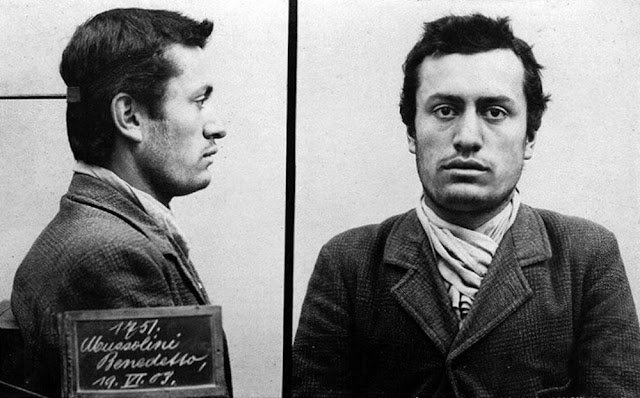
Benito Mussolini’s mugshot taken on 20 June 1903 in Bern, Switzerland.
Benito Mussolini, born on July 29, 1883, grew up in a poor environment in Italy, with his father being an enthusiastic carpenter and socialist. This social and political background greatly influenced Mussolini’s early orientations, as he adopted socialist ideology in his youth.
In June 1902, to avoid mandatory conscription, Mussolini moved to Switzerland where he became associated with Italian socialists. He worked as a bricklayer, got involved in journalism, and joined a trade union. His agitative activities and calls for civil rebellion led to his arrest in 1903 by the Swiss police for supporting a violent strike and he was deported back to Italy due to lack of identification papers.

Mugshot and fingerprints of a young Marxist named ‘Benedetto’ Mussolini. Bern, Switzerland, 1903.
In 1905, Mussolini returned permanently to Italy and voluntarily joined the Italian army, where he served for two years. During his service, he demonstrated leadership skills and earned a reputation as an outstanding soldier.
After his military experience, Mussolini returned to politics and gradually shifted from socialism to extreme right-wing ideologies. In 1919, he founded Italian Fascism, emphasizing violent nationalism and authoritarianism. He managed to enhance his power and rose to power as Prime Minister in October 1922. During his rule, Mussolini exhibited diplomatic and political skills, but followed oppressive and authoritarian policies.
Mussolini was known for his boldness, arrogance, and fascist aspirations. He dreamt of restoring Italy to its ancient Roman glory and achieving the status of a superpower. He ruled Italy as a fascist dictator from 1922 until his downfall in 1943, resulting in a long-lasting impact on Italian and world history. His transformation from a young socialist activist to a fascist dictator reflects a dramatic shift in thought and politics.
Discover more from History in Pictures
Subscribe to get the latest posts sent to your email.